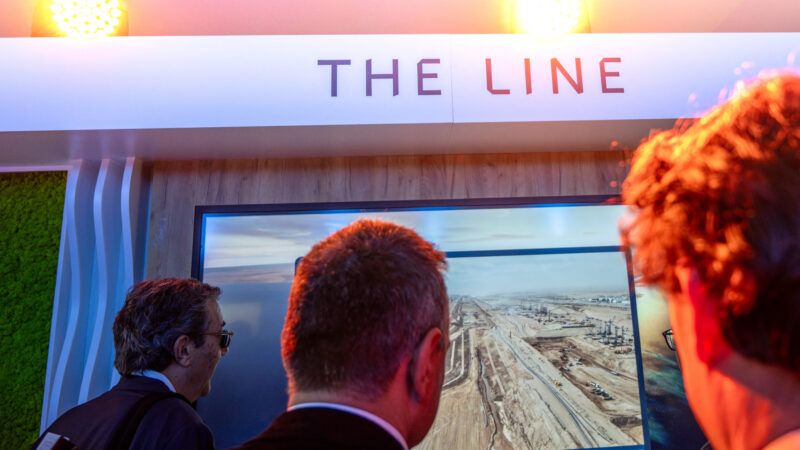Saudi Arabia's 'The Line' Violates Human Rights and Common Sense
Inhumane labor practices, worker deaths, and the forced eviction and repression of local residents have characterized the kingdom's efforts to build a miles-long linear skyscraper in the desert.

It turns out that Saudi Arabia's The Line project is a massive violation of good urban design principles and human rights.
A growing chorus of workers, whistleblowers, and human rights organizations say that the ongoing construction of The Line—which is supposed to be a 100-mile-long skyscraper upon completion—has been marred by inhumane labor practices, worker deaths, and the forced eviction of thousands of nearby villagers.
Most recently, The Line workers told an ITV documentary crew that they've been forced to work 16-hour shifts weeks in a row, resulting in mounting workplace accidents and even deaths.
In September, The Wall Street Journal published an investigation finding that The Line executives had reacted with callousness and casual racism when informed of multiple worker deaths that occurred because of unsafe conditions. The Journal also found a pattern of self-dealing and corruption allegations among top executives.
Upwards of 6,000 villagers have been forced from their homes near The Line construction site, reported the BBC earlier this year. Saudi human rights watchdogs say that dozens of people who've protested the evictions have been given prison sentences ranging from 15 to 50 years, and at least five protestors have been sentenced to death.
Saudi Crown Prince Mohammed Bin Salman unveiled The Line in 2021 as part of his grand Neom initiative to create a new, high-tech, urban megaregion in the Kingdom's remote Tabuk province.
The mounting accusations of rights violations surrounding the Neom initiative are shocking but not necessarily surprising.
Human rights groups have long criticized Saudi Arabia's terrible routine treatment of migrant workers and the "slavery-like" conditions they often toil under. It would be expected that these same abuses would show up at The Line.
Major government-backed land redevelopment schemes also typically involve the mass confiscation of land from private owners, even in free countries.
The United States government, with all its constitutional protections for private property, carved up existing neighborhoods for mid-century urban renewal projects. It's little surprise then that Saudi Arabia's theocratic monarchy has engaged in even worse rights violations of nearby villagers. This all adds an element of tragedy to what has always been a farcical project.
There is a reason no other city in the world is arranged in one big, long line: That's a really inefficient layout for an urban area.
As former World Bank economist Alain Bertaud has documented, cities in even remotely capitalist countries all look kind of the same: an ultra-dense urban core surrounded by decreasingly dense neighborhoods radiating outward.
This is a result of land prices that place a premium on city center development, where access to the rest of the urban area is easiest.
The Line screws all this up. A linear city of uniform density would have the same number of homes and amenities at every point, despite demand likely being a lot higher at the line's midpoint and a lot lower on its wings. Incredibly valuable land above and below the line is left entirely vacant.
The Line's design also calls for minutely designed neighborhoods where all the amenities of daily life are within a five-minute walk away. That would leave little room for the redevelopment and readaptation of businesses and homes in response to the changing needs of The Line residents.
In short, The Line is not something private property owners spending their own money would build. Where people do have at least a modicum of freedom to own, develop, and trade property, the built environment looks a lot different.
It's little surprising then that the people building a city with little room for future residents' individual agency have little respect for the rights of workers and existing inhabitants of the area either.
Rent Free is a weekly newsletter from Christian Britschgi on urbanism and the fight for less regulation, more housing, more property rights, and more freedom in America's cities.


Show Comments (14)